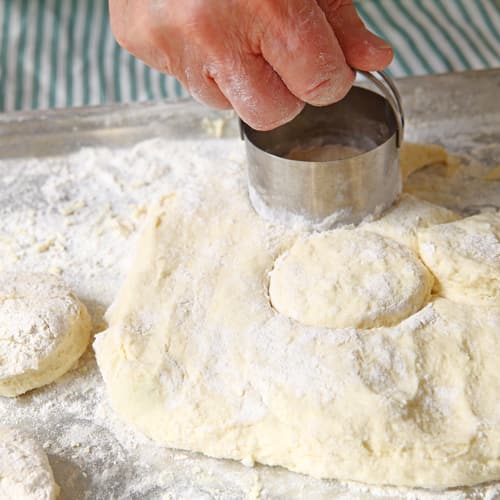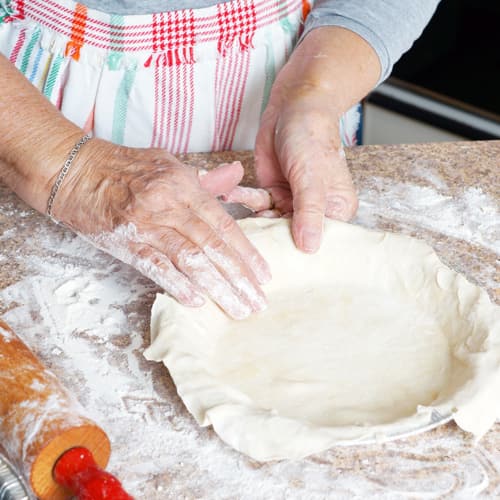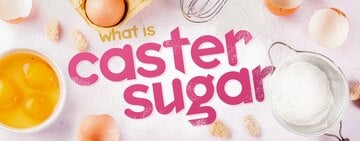Everything You Need to Know About Pastry Flour
It's no secret for passionate bakers that many types of flour are available for various baking needs. Pastry flour, in particular, is a popular choice among bakers, given its low protein content. Understanding the distinctive benefits of using pastry flour is crucial for achieving the ideal texture in your baked goods. We'll define pastry flour, distinguish it from cake flour, and provide a convenient alternative for when you run out of pastry flour.
What Is Pastry Flour?

Pastry flour is flour with around 8-10% protein content, which is less than the 10-12% in all-purpose flour. While the amount of protein in pastry flour varies from brand to brand, pastry flour typically has less protein than all-purpose flour. You may also see some bakers refer to pastry flour as cookie flour.
Pastry Flour Uses
The more protein your flour has, the more dense or chewy your baked goods will be. Because of its comparatively low protein content, pastry flour is ideal for making pie crusts, biscuits, cookies, French pastries, and other flaky baked goods. Protein helps to give your finished product structure, so flaky or airy recipes tend to call for lower-protein flour. Using a different type of flour with a higher protein content could make your baked goods tougher or chewier than desired.
Is Pastry Flour the Same as Cake Flour?
No, cake flour and pastry flour are not the same. With 7-8% protein content, cake flour has even less protein than pastry flour. Plus, cake flour is bleached during milling to weaken its proteins. As a result, cake flour is best for making ultra-light baked goods, such as angel food cake and chiffon cake. Using cake flour instead of pastry flour may cause your baked goods to fall apart from lack of structure. Be sure to use a food scale when measuring either type of flour to get the most accurate measurement.
Pastry Flour Substitute

If you need a substitution for pastry flour, there are a few alternatives that you can use. However, these options are not guaranteed to serve as a perfect substitute for pastry flour, so there is a chance that they will produce a different texture than your recipe intends.
Substitute Pastry Flour with All-Purpose and Cake Flour
To create the most reliable substitute for pastry flour, combine 1/2 cup of all-purpose flour with 1/2 cup of cake flour for every 1 cup of pastry flour needed.
Substitute Pastry Flour with All-Purpose Flour and Corn Starch
If you don’t have cake flour, you can substitute 1 cup of pastry flour for 1 scant (slightly underfilled) cup of all-purpose flour plus 2 tablespoons of corn starch.
Pastry flour is a versatile ingredient perfect for creating baked goods such as pie dough, cookies, and biscuits. It has a protein content lower than all-purpose flour and higher than cake flour. This unique balance makes pastry flour an excellent choice for achieving a flaky and light texture in your baked treats. If you don't have pastry flour readily available, you can consult our helpful guide on substituting it with a blend of all-purpose flour and cake flour or all-purpose flour and corn starch.
Related Resources

How to Start a Home Bakery
If you want to start a baking business but owning a storefront isn't for you, operating a home bakery can be a great alternative. Starting a home bakery is also a good option for those looking to get started in the restaurant industry, and bakers at home due to coronavirus. Usually smaller in scale than retail or wholesale bakeries, home bakeries allow bakers to sell products that are made in their own homes. But there is more to starting a home baking business than just making bulk batches of cookies in your personal kitchen. To learn more about what it takes to open a home bakery, keep reading. Shop All Bakery Supplies How to Start a Bakery Business from Home Before you open your home bakery, there are some key factors that you need to consider. In this guide, we'll walk you through your first steps, beginning with researching legalities and ending with home bakery marketing strategies. Use the following links to navigate and learn more about a specific aspect of opening a home bakery: Home Bakery Laws Home Bakery Market Research Certifications, Licenses, and Health Requirements Marketing Your Home Bakery Costs: Initial and Ongoing Expenses Home Bakery Laws The most important step before opening a home-based bakery is to make sure that home bakeries are legal in your area. The laws surrounding home bakeries vary greatly from state to state, so you must do your research before investing in your home baking business. Before you begin, be sure to visit your state’s Department of Health website to see what is legal under laws that are often referred to as "cottage food laws." What Are Cottage Food Laws? Cottage food laws regulate whether or not you can produce low-risk foods in your home for sale. Often, these foods include certain baked goods, candies, pickled products, dry goods, and canned foods. Cottage food laws are designed for very small businesses, with many states putting a cap on how many thousands of dollars in revenue your business can make while still considered legal. Not only do these laws limit your sales and what kinds of foods you can make, but they also limit where you can sell your products. Many states specify legal venues, which may include farmer’s markets, events, roadside stands, online, or even your home. This being said, some states have strict limitations on these venues. For instance, what may be legal to sell at a farmer’s market in one county may not be legal in a neighboring county. Each time you sell your goods at a new venue, be sure to research whether or not it is prohibited first. Additionally, home bakeries may be restricted in certain jurisdictions even within states where they are legal. It is imperative to check your local zoning laws so that you are not fined or shut down for opening a baking business in an area that is zoned for residences. Certifications, Licenses, and Health Requirements Once you know that your state and jurisdiction will allow you to open a home bakery, you must look into what kinds of certifications, licenses, and health precautions are required. Some states do not require licenses for small-scale businesses under cottage food laws, but some states do mandate that you acquire certification and a business license. Changes to Your Kitchen Layout Depending on your home kitchen's current layout, you may need to make adjustments before your bakery can be opened for operation. Check with your state’s laws to see if any changes are mandatory, which may include the following: Installing additional sinks Creating separate food storage and food preparation areas from your personal kitchen area Adding a sprinkler system Updating your ventilation system or hoods Health Inspection Considerations Your state may also require owners of home bakeries to pass health inspections. These visits from Health Officers could assess everything from the equipment you use and your means of storage to employment practices and sanitation methods. Inspectors may also be on the lookout for prepared goods and ingredients being stored or served at proper temperatures. Food Safety Certification Another certification you may be required to obtain is a food safety certificate. There are many state-approved food safety courses available that educate you in proper food handling, storage, and preparation techniques to avoid the risk of cross-contamination and foodborne illness. While many states have numerous laws surrounding home bakeries, with the proper research and qualifications, you can open a safe and legal operation. Costs: Initial and Ongoing Expenses The next step in opening your home bakery is to come up with a thorough business plan. As you write this plan, you’ll have to consider your startup costs as well as your financial projections. Below, we list some expenses that you can expect as you prepare to open your bakery: Home Bakery Startup Costs Renovations Kitchen equipment License fees Insurance Beginning inventory or ingredients But just because there is a lot of required cost for starting your small business, that doesn't mean you can't follow a few tips to help save and cut down your spending. Here are some helpful pointers for saving your new business some money: Purchase smallwares, hand tools, and other bakery supplies in bulk online to save money. Buy your ingredients in bulk from farmer’s markets or wholesale retailers rather than from grocery stores. Take note of how much gas you're using. Try to limit your trips to replenish ingredients and supplies, and if you're planning to deliver goods, decide how large of a radius you’d like to serve. Start with crowd-pleasing recipes to make your first sales. As time goes on, experiment with more unique products to keep your customer base intrigued. After you've tallied your startup costs, apply them to your financial projections. To make financial projections for your bakery business plan, you must outline your ongoing costs and compare them to the success you expect as a result of your market research. Below, we explain how to find the target market for your home bakery. Home Bakery Market Research Your target market, or the population you are catering to, is one of the most important aspects of your business plan. With various types of bakeries to choose from, you have to find your niche while also complying with the product and venue restrictions that your state has in place. Here are some example target markets and suggestions for best capturing their business. Before you try to sell to these markets, be sure to check that they are legal venues within your home bakery’s jurisdiction. Offices or Corporate Buildings This market may like to serve food at their frequent meetings in the morning and afternoon hours. For these customers, you can deliver your baked goods on serving trays for easy sharing. Products for the Office or Corporate Building Market Assorted muffins Small pastries Bagels Doughnuts Schools From fundraiser events to PTA meetings and class parties, schools often have gatherings where your products could be served. Products for the School Market Assorted cookies Brownies Decorated cupcakes Restaurants If you live in a town full of family-style diners or other busy restaurants, then these establishments could be a great target market for you. Many restaurants want to serve dessert options, but they may not have the time or space to produce them. Products for the Restaurant Market Cakes Cheesecakes Pies Nut Breads Seasonal specials Regional desserts: cannoli, tiramisu, baklava Health-Conscious Customers Perhaps you live in a young, active, up-and-coming neighborhood. Your target customers may have gluten-free diets or want low-calorie treats to suit their busy lifestyle, and so this market is the perfect opportunity for you to offer unique dessert alternatives. Products for the Health-Conscious Market Granola Flourless cakes Nut breads Trail mixes Be sure to clearly label any allergens that may be present in your baked goods. Additionally, it may be a good idea to label items that are vegan-friendly. Marketing Your Home Bakery To get your bakery business off the ground, you need to make sure that your market knows you’re open for operation. Here are some ways you can market your home baking business. Word of Mouth By actively engaging yourself within your residential community, you not only market yourself, but you build relationships with customers. If these customers are satisfied with the consistent quality of your baked goods, they will return for more business and spread the word of your bakery. Online Marketing and Social Media Develop a website or create a Facebook page for your bakery. Tweet about upcoming specials and post pictures on Instagram of your products to gain followers who could become your customers. Sell at Local Events or Venues In this case, the quality of your products will speak for itself. The more that you make your quality baked goods visible at your venues of sale, the more you’ll build a customer base who may contact you for special orders. If you want to start a home baking business, there are several rules and regulations that you need to research before you begin investing. Check with your state and local governments to see if home bakeries are legal in your area, and then find out what kind of licenses are required. Once you have all legal matters sorted out, it's important to do market research and choose your business's niche. As you start your new home bakery, refer to this article for guidance through the opening process. <aside class="pquote"> <blockquote> The information provided on this website does not, and is not intended to, constitute legal advice. Please refer to our Content Policy for more details. </blockquote> </aside>

What Is Caster Sugar?
Caster sugar is granulated sugar with a very fine consistency. Also called castor sugar or superfine sugar, caster sugar contains grains that are finer than table sugar, but not as fine as confectioners sugar. The texture of caster sugar makes it the best type of sugar for making certain desserts, baked goods, and cocktails. Whether you're starting a new bakery or are a seasoned baker, we'll help you learn answers to questions like "is caster sugar the same as powdered sugar?" and teach you how to make castor sugar out of ingredients you already have in your pantry. Shop All Sweeteners What Is Caster Sugar in the US? Caster sugar in America is often called superfine sugar, baker’s sugar, castor sugar, or bar sugar. It is a term used in the UK as well as the US, and in both cases, it refers to sugar that is ground to a consistency between granulated and powdered sugar in coarseness. Caster sugar is more commonly used in British baking. Caster Sugar Uses Caster sugar is often called for in recipes for delicate baked goods like meringues, souffles, and sponge cakes. Because of its ability to dissolve easily, caster sugar is also frequently used as a bar ingredient for sweetening drinks. Many bartenders use caster sugar in place of simple syrup when making cocktails. Here are some more uses for caster sugar: Whipped Cream Cookies Mousse Shortbread Caramel Sauce Orange Daiquiri Raspberry-Infused Gin Caster Sugar vs Granulated Sugar The only difference between caster sugar and granulated sugar is their texture. Caster sugar has more finely ground crystals than granulated sugar, which means it dissolves faster than granulated sugar in creamed mixtures and whips. Granulated sugar can be used to make caster sugar. Caster Sugar vs Powdered Sugar The difference between caster sugar and powdered sugar is that powdered sugar (also called confectioner’s sugar or icing sugar) is more finely ground than caster sugar. In the United States, powdered sugar also typically contains an anti-caking agent, like cornstarch, that makes up 3-5% of the sugar. Because it does not have the same powdery texture, caster sugar does not contain any agents to prevent clumping. What Is Golden Caster Sugar? Golden caster sugar, also known as raw caster sugar, is an unrefined caster sugar that's also made from sugar cane or beets. Golden caster sugar does not go through the same refining process as white caster sugar, therefore retaining a golden brown color from the molasses that naturally occurs in the sugar cane. Golden caster sugar can be used in place of regular caster sugar and vice versa. Golden Caster Sugar vs Brown Sugar The difference between golden caster sugar and brown sugar is that golden caster sugar does not include any additional molasses during its processing as US brown sugar does. The molasses in golden sugar occurs naturally and is not added. Although both have molasses in them, brown sugar and golden caster sugar are not interchangeable. Caster Sugar Substitute You might be asking yourself, "what is a substitute for caster sugar?" The best caster sugar substitute is to make caster sugar yourself from granulated sugar. If you use just granulate sugar, you won't achieve the smooth texture that caster sugar provides. We've added a castor sugar recipe below so you can make your own in minutes. Can I Use Granulated Sugar Instead of Caster Sugar? Substituting granulated sugar for caster sugar could give your recipe a grainy texture. Instead, throw your granulated sugar into a food processor to create the desired coarseness of castor sugar. Can I Use Powdered Sugar Instead of Caster Sugar? When comparing icing sugar vs caster sugar, you'll find that powdered sugar is not a perfect substitution for caster sugar. If your recipe calls for caster sugar and you don’t have any on hand, it may be tempting to substitute powdered sugar for caster sugar. However, using powdered sugar instead of caster sugar could give your baked goods a thin texture that may even ruin your recipe. How to Make Caster Sugar Video Follow our step-by-step video below on how to make caster sugar. <iframe itemprop="embedURL" width="560" height="315" src="https://www.youtube.com/embed/R_egidULZvw?rel=0" frameborder="0" allowfullscreen=""></iframe> How to Make Caster Sugar Follow the steps below to make caster sugar from granulated sugar in minutes. For every 1 cup of caster sugar that your recipe calls for, add 1 cup plus two teaspoons of granulated sugar to a clean coffee or spice grinder, food processor, or blender. Grind the granulated sugar for only a few seconds, until the sugar is finer in texture, but it is not fine enough to form a powder that starts to clump together. For added precision, run your homemade caster sugar through a fine strainer before adding it to your recipe. Where to Buy Caster Sugar One can buy caster sugar from online retailers, international goods retailers, and most grocery stores. Caster sugar is useful for making smooth and consistent sweetened baked goods. It is a great addition to any successful bar for effortlessly adding sweetness to beverages on the drink menu. Next time your recipe calls for caster sugar and you don't have any, don't reach for the powdered sugar. Instead, try making your own caster sugar in a blender, food processor, or spice grinder.

What Is Bread Flour?
When creating the ideal texture for loaves of bread, many bakers turn to bread flour. But what exactly is bread flour, and how is it different from all-purpose flour? Bread flour is a high-protein flour that is specifically designed for baking bread. With its strong gluten content, bread flour gives bread a chewier texture and helps it rise higher. Read on to learn the characteristics of bread flour, what it's used for, and how it differs from all-purpose flour. Shop All Bread Flour What Is Bread Flour Used For? Bread flour is a high-protein flour that typically contains between 12% - 14% protein and is designed for baking yeasted bread. The high protein content means that bread flour has more gluten in it, which makes the dough more elastic and light. It requires significant kneading to create a good gluten structure, which gives bread its chewy, airy texture when baked. As the name suggests, bread flour is used for making various bread types, like sourdough and white bread. It is also ideal for other recipes where you desire more structure and a chewier consistency, such as pizza dough, flatbreads, pretzels, and bagels. What Is Strong Flour? Strong flour, or strong bread flour, is just another name for bread flour that is commonly used in the United Kingdom. There is no difference between bread flour and strong bread flour, strong flour, or hard flour. Bread flour is sometimes called strong flour because the flour is made from hard wheat varieties, unlike other types of flour. Bread Flour vs All-Purpose Flour The main difference between bread flour and all-purpose flour is the type of wheat used and their respective protein contents. Bread flour is made from hard wheat and usually contains 12% - 14% protein. All-purpose flour is made from soft and hard wheat and has an average of 8% - 11% protein. The presence of more protein translates to a higher formation of gluten, which plays a crucial role in the overall texture of bread products. Its ability to create a strong, elastic network of gluten strands gives bread the desired chewy texture and airy rise. While bread flour is designed for bread-making, all-purpose flour is a more versatile option that can be used in a wide range of recipes. All-purpose flour is best for cakes, cookies, muffins, pastries, and quick breads. If you're aiming for a crusty, chewy bread with a slightly denser crumb, bread flour is the way to go. Its higher protein content and gluten development contribute to a crustier exterior and a chewier texture. On the other hand, all-purpose flour, with its lower protein content, tends to produce a lighter, softer texture and a thinner crust. Substitutes for Bread Flour While bread flour is a staple ingredient in many bread recipes, there are times when you may find yourself without this specific type of flour in your pantry. Luckily, there are a few other types of flour that can be used as a substitute for bread flour in a pinch. All-Purpose Flour: As its name suggests, all-purpose flour is a versatile option that can be used in a variety of recipes, including bread. It has a moderate protein content, usually around 8% - 11%, which is lower than bread flour but will still provide volume. Generally, you can swap in unbleached all-purpose flour for bread flour in a 1:1 ratio. You can also add vital wheat gluten to the all-purpose flour, which provides the additional protein needed to create the ideal texture for your bread dough. Whole Wheat Flour: Made from grinding whole wheat kernels, whole wheat flour adds a nutty flavor and a hearty texture to your bread. It has a higher protein content than all-purpose flour, typically around 14%, which helps create a good structure in the bread. However, due to its higher fiber content, you may need to adjust the amount of liquid in your recipe to achieve the desired consistency. Rye Flour: If you're looking to create traditional rye bread, then rye flour is the best flour type to use in your recipe. It has a low protein content and less gluten than all-purpose flour, creating a unique density in bread baked from it. Rye flour can also be used to create deeply flavorful pumpernickel bread, bring depth to pizza crusts, and feed your sourdough starter. There are some flour types, like cake or pastry flour, that should not be used as a substitute for bread flour. These flours are relatively low in protein since they are designed to produce tender, fluffy cakes and pastries, so they would not be able to develop the gluten structure needed for the right bread texture and rise. Whether you're looking to bake fresh white bread or you want to start making sourdough, high-protein bread flour is a great addition to your arsenal of bread-making supplies. Its higher protein content provides the necessary strength and structure for bread dough, resulting in a lighter and chewier texture. Additionally, the increased gluten development in bread flour enhances the rise and volume of baked goods.





